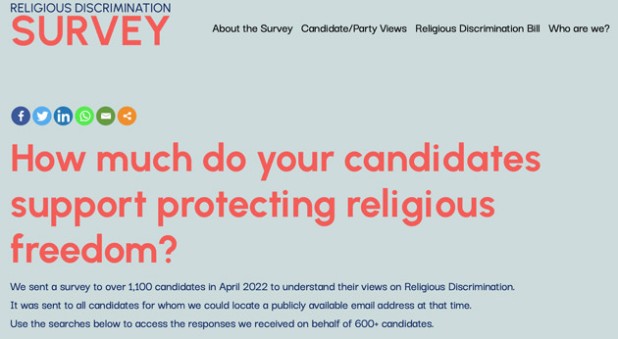A survey of political parties and candidates on their attitude to religious discrimination has revealed varying levels of support – and in some cases, no support – for measures to ensure religious freedom.
Before the election campaign, the Religious Discrimination Bill (RDB) passed the House of Representatives by a resounding majority, with both sides of politics strongly affirming the need for people of faith or no faith to be protected from religious discrimination.
Earlier, the RDB received bipartisan support from two separate parliamentary committees. However, the Bill was withdrawn by the Government before proceeding to the Senate.
Now that the issue will be left to the next government and the new Parliament, faith leaders – including representatives from the Jewish and Islamic faiths – have surveyed the major parties, producing a website at www.religiousdiscriminationsurvey.au to guide voters on how candidates treat the issues.
The survey was emailed to more than 1100 candidates in April; 526 candidates for the House of Representatives responded, as well as 124 candidates for the Senate. Individual responses (which include some from minor parties) are on the website.
In summary, the overall party response from the Coalition gave the greatest amount of detail on the protection of religious freedom, committing to legislation that gives the same or greater levels of protection than the 2021 Bill and its associated bills.
The ALP said it was committed to preventing discrimination against people of faith, including through the introduction of religious anti-vilification protections, but could not give details.
“We are not in a position to work through detailed policy implementation proposals, or to consult fully upon them with the wider Australian community on the eve of an election,” the ALP response said.
The response from the Greens would not guarantee protections similar to the RDB, proposing instead a Charter of Rights.
It is important for Christians to be informed as we approach a federal election, with this issue just as much as a number of other issues - Bishop Michael Stead
One of the key survey questions asked about support for the principle underlying Clause 12 of the RDB, that people who make statements of belief or unbelief that are in good faith, without malice – and made without vilifying, threatening, harassing or intimidating others, or inciting the commission of a serious criminal offence – should not be subject to discrimination complaints.
The Coalition response supported the principle of Clause 12 of the Bill and will seek to retain it. The ALP would not comment on this question. The Greens said they do not support explicit protections for statements of belief.
The Bishop of South Sydney, Michael Stead, who led the survey, also successfully moved a motion in the Anglican General Synod last week that expresses disappointment about there still being no national legislation prohibiting religious discrimination. The motion “calls upon the government formed after the next Federal election to give priority to the passage of a national legislation prohibiting religious discrimination, and to do this in such a way that does not harm other people, including LGBTQI+ members of their school communities, or to polarise the wider community on these issues.”
Bishop Stead says the purpose of the survey is not to tell people how to vote, but to fill an information gap on an important issue.
“As the events of the last few months have demonstrated, protecting people of faith against religious discrimination is complex and the different candidates and parties are proposing very different approaches,” he said. “It is important for Christians to be informed as we approach a Federal election, with this issue just as much as a number of other issues.”






















